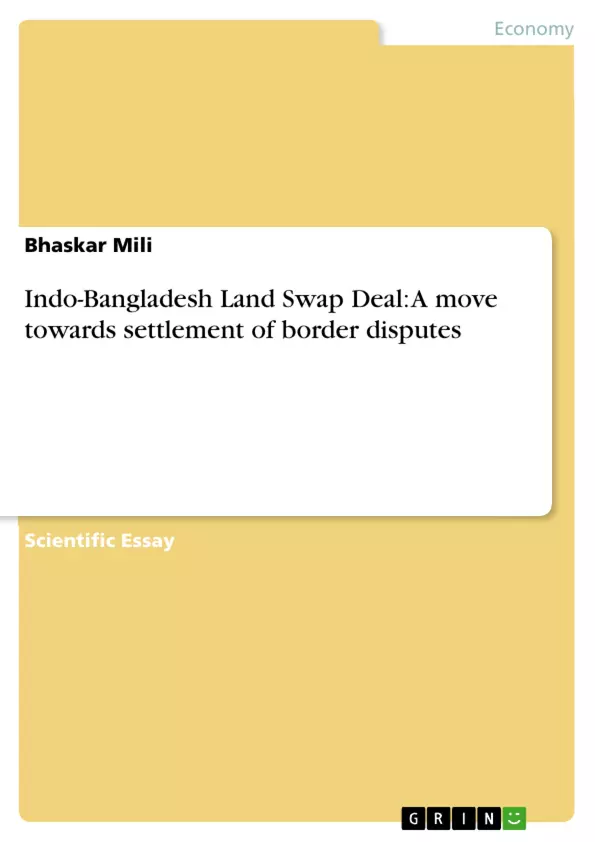The Indo- Bangladesh land swapping deal was signed by the two nations during visit of Prime Minister Manmohan Singh on 6th September 2011. Futures of some 162 enclaves were decided by this land agreement. Since the creation of Pakistan in 1947 these enclaves left without development by their respective country due problem of communication and lack of interest by the political authorities. These enclaves also remain as an obstacle in the way of completing the bare wire fence in the border that caused huge illegal migrants to Assam and other north eastern states. The conclusion of the deal could help India, particularly Assam to control illegal migrants from the neighbouring nation and could also helpful to sort out the long standing border disputes between the two nations.
Inhaltsverzeichnis (Table of Contents)
- Abstract
- Full Paper
- Introduction
- The Border Disputes
- The 1974 Border Agreement
- Illegal Migration and Border Disputes
- The 2001 Border Incident
- The Land Swap Deal
- Conclusion
Zielsetzung und Themenschwerpunkte (Objectives and Key Themes)
This paper examines the historical context of the Indo-Bangladesh border disputes, tracing their origins back to the partition of India in 1947. The paper also analyzes the various attempts at resolving these disputes, including the 1974 Border Agreement, the 2001 incident involving the killing of BSF personnel, and the subsequent land swap deal. The author aims to highlight the complex political and social factors that have contributed to these ongoing disputes.
- The origins and evolution of India-Bangladesh border disputes
- The impact of the Radcliffe Award and subsequent agreements
- The challenges of illegal migration and border security
- The role of enclaves in exacerbating border disputes
- The potential of the land swap deal to resolve long-standing issues
Zusammenfassung der Kapitel (Chapter Summaries)
The paper begins by providing a historical overview of the India-Bangladesh border disputes, highlighting their roots in the partition of India in 1947 and the complexities arising from the Radcliffe Award. The paper then delves into the 1974 Border Agreement, outlining its aims and challenges in achieving a lasting solution to the border demarcation issues. The paper then focuses on the problem of illegal migration from Bangladesh into India, analyzing the factors contributing to this issue and its impact on border security.
The paper then examines the 2001 border incident involving the killing of BSF personnel by Bangladesh Rifles, highlighting the tensions that continue to exist despite efforts to resolve the border disputes. Finally, the paper explores the land swap deal as a potential solution to the long-standing issue of enclaves, analyzing the complexities and potential benefits of this approach.
Schlüsselwörter (Keywords)
India-Bangladesh relations, border disputes, enclaves, illegal migration, land swap deal, Radcliffe Award, 1974 Border Agreement, BSF, Bangladesh Rifles.
Frequently Asked Questions
What was the Indo-Bangladesh land swap deal of 2011?
Signed on September 6, 2011, this agreement aimed to resolve long-standing border disputes by deciding the future of 162 enclaves located along the border between the two nations.
What are enclaves in the context of the India-Bangladesh border?
Enclaves are small pockets of land belonging to one country but completely surrounded by the territory of the other. They originated from the partition of 1947 and caused significant administrative and human rights challenges.
What role did the Radcliffe Award play in border disputes?
The Radcliffe Award of 1947 defined the boundaries during the partition of India but left many areas ambiguous, leading to decades of territorial disagreements between India and East Pakistan (later Bangladesh).
How does the land swap deal address illegal migration?
By demarcating the border clearly and allowing for the completion of wire fencing, the deal helps India, especially the state of Assam, to better control illegal migration from Bangladesh.
What happened during the 2001 border incident?
The 2001 incident involved violent clashes and the killing of Indian Border Security Force (BSF) personnel by Bangladesh Rifles, highlighting the severe tensions caused by unresolved border issues.
- Quote paper
- Bhaskar Mili (Author), 2014, Indo-Bangladesh Land Swap Deal: A move towards settlement of border disputes, Munich, GRIN Verlag, https://www.grin.com/document/286531



